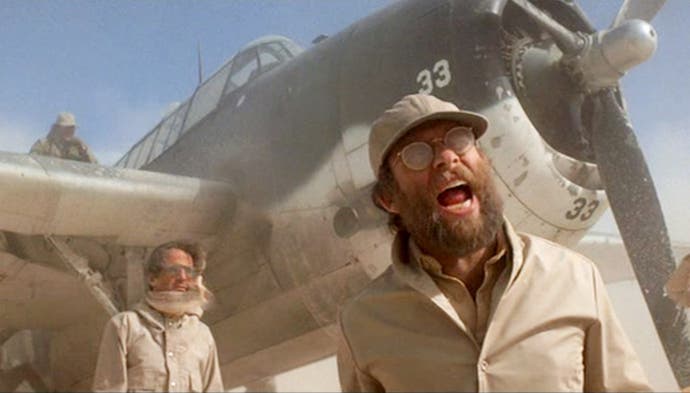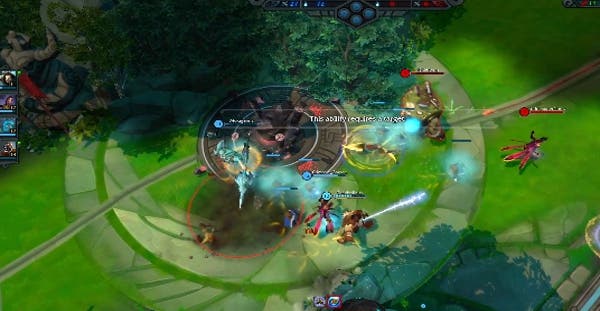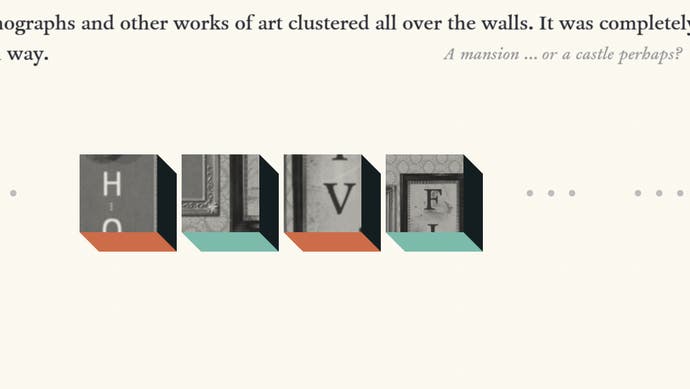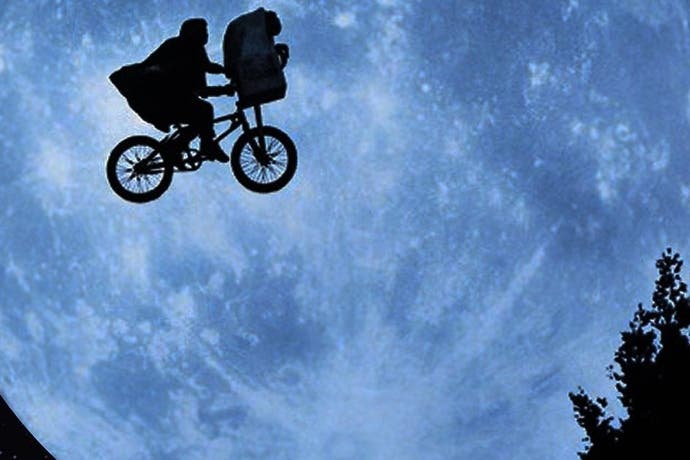Grave business: ET, Atari, and the reason some games need to be buried
"Dig up the past, all you get is dirty."
It's fitting that the whole thing was inspired, however tortuously, by a Steven Spielberg movie. Because, when I play it out in my imagination, it feels like a Steven Spielberg movie. Like the beginning of one of the older films, where the spirit of 1970s cinema is clear to see, where the early scenes are hectic and confusing and filled with overlapping chatter.
It's Alamogordo, New Mexico, and out of the dust clouds come diggers. Then come men in face masks and hard hats, followed by film crews, by sun-startled executives. Spielberg would have done wonders with a figure like Larry "Major Nelson" Hyrb - the suit who's dressed himself up as a binman today just for the cameras. I can see him peeling off his glinting aviators in practised wonderment as the first broken cartridges come out of the ground. He's holding one delicately. He's turning it over in his hands.
This is ET: The Extra-Terrestrial, the legendary Atari disaster which has just been dug up in the desert where the company that made it buried the evidence after the whole thing turned out to be a dog. You've possibly read a lot of conflicting things about it since then. That the game alone caused the death of Atari and sent the entire industry to sleep for years. That the game was the fall guy for broken business practices and it actually wasn't too bad. That the game's a full-blown masterpiece, that it was never truly buried at all, and that it wasn't then subsequently disinterred a few days ago - and that Major Nelson's hard hat has been Photoshopped onto him in the pictures.
What's not really up for discussion, though, is that Atari was once synonymous with the gaming industry, and the company ended up throwing everything away. It missed the ball and avoided a high score. According to a VentureBeat article from March this year, the modern outfit that owns the Atari name and just launched Rollercoaster Tycoon 4 on mobile ("I inadvertently turned my ice cream parlour into a hot dog stand while swiping to browse a menu," - 1/10, Eurogamer.net,) has fewer than a dozen employees and only recently emerged from bankruptcy. Its new focus is apparently casino games. And, what's also not up for discussion is that video games crashed hard back in the 1980s, and the kind of thinking that led to ET and its dusty resting place seems largely responsible. I'm starting to wonder whether that thinking has really changed very much.

The collapse of Atari as a creative force, and the collapse of the wider industry in the early 1980s, is inevitably a complex tangle of individual failures. If I could personally only draw one scarlet thread out of it, though, it would be this: the people who sold video games no longer respected them. They had no restraint, and they got to a point where they were shipping bad games in ridiculous quantities and expecting idiot punters to continue to buy them. A lack of respect only spreads, and that's what happened. Those punters weren't idiotic after all, and they tired of sorting the good stuff from the bad. Atari and its ilk treated games as a gold mine and eventually, as is often the case, as a strip mine. You can make decent money off a strip mine right up until the moment that you suddenly can't chisel anything more from it at all. And, even at the best of times, nobody wants to actually live next door to a strip mine.
The rest is legend. Inevitably, new people eventually came along who did respect games, and the NES started the whole thing ticking over once more. There's a very positive message here, and it's worth hearing it. Games are so transporting, so vital, so thrilling in the right hands, that us humans will always need them. They can always come back from the brink, or from going over the brink. Looking around today there's another rather darker message, however. I don't think games are going to crash again, but it's a frightening thought that 30 years ago a lack of restraint killed the industry. It's frightening because, 30 years later, restraint is still pretty hard to come by.
It might seem weird to talk of a lack of restraint as a negative thing with regards to a creative business. If you love playing games, you should surely love there being lots and lots of them. If you love making games and selling them, isn't it a case of the more the merrier? The problem, though, is that the big players of the industry - with a few very notable exceptions - really seems to struggle to look past the next few years when it comes to balancing profits against sustainability. Atari isn't the only company eyeing up the casino business - the whole of gaming's been hitting the slots for decades.
Look, as smarter people than me have suggested, at some of the last few high-profile migrations: to Facebook and social gaming, to mobile. Some great games have emerged from all this, but spare a thought for the landscape left behind afterwards. Social gaming has all but collapsed as a meaningful creative force, undermined by consumer cynicism and the gouging and shifting terms and conditions platform holders have imposed - in part, to be fair, because of the grim, intrusive practices that inspired that cynicism. Mobile, meanwhile, sometimes feels like a real tragedy - at first a flowering of brilliant, imaginative games, often made by people who had never had the proper access to an audience before and were inspired by an unusual new interface and the new thinking it demanded.

But with that access - and without curation by companies that actually appreciated games - came a race to the bottom, where much of the good stuff was then buried by an endless deluge of miserable clones and cash-grabs that were allowed in because the gatekeepers didn't care. Free-to-play is not the problem - it's that publishers and platform holders and sometimes even developers let the deeper value of a game erode, that there was often a failure to find the correct free-to-play model that enhanced a game - and that some people apparently think it's fine to refer to their most valued customers as whales.
Certain companies are still making a lot of money in this market today, but they're making a lot of money today. For every Dungeon Keeper or Rollercoaster Tycoon 4 that's released, the creative spirit of games, and the integrity of games, is damaged, and in the long term, these are the things that actually matter to everyone, regardless of which side of the supply and demand curve they're sat. Just ask Atari. (The old, dead Atari, I mean, rather than the new, undead Atari.)
Mobile's still turning out great games from great designers, of course, but I don't envy the talented and the conscientious who have to operate in that environment. They're being smothered with each new dump-truck of Flappy Bird knock-offs that backs up to their marketplaces everyday. Meanwhile, a lot of people are already looking ahead, to platforms like the PC where the next battle for games may well be fought.
At this year's GDC rant session, designer and author Greg Costikyan summed up these problems with social and mobile games in a speech too cogent and thoughtful to truly qualify as a rant - a speedy analysis of the effects of monopolistic distribution channels run along the wrong lines. It was comprehensive and devastating, and he had a firm sense of where things were going, too. "The indie revolution has been sustained by one thing: Steam... What's happened with PC games is that we swapped a world in which you had many possible distributors - admittedly distributing into a declining retail market - into a world in which one company has a virtual monopoly. And that company is moving from a curated market, in which you were virtually guaranteed success if you passed their curatorial bar, into a total free-for-all, like the mess which is the Apple App Store, in which it will be well nigh impossible to reach an audience unless you are at least as good at public relations and marketing as you are at game development - something true of very, very few indie developers."

"Games markets are killed by greed and a lack of taste," Costikyan continued, and sadly it's probably not just markets in their traditional sense that are threatened. Just look at Kickstarter, so recently a brilliant new avenue for promising oddities, now increasingly a site that sees those games matched and sometimes outnumbered by knackered old ideas that cough their ways through the Early Access process and wouldn't have cut it with a publisher, not because they're too out there, too blue sky, too ingenious for the money men to understand, but because they just aren't very promising. We need places like Kickstarter, because for some games it's really the best route to completion. Used in good faith, it's capable of wonders. But the bad practices - or the developers rushing in out of simple desperation because it's so hard to be noticed in the other channels now - poison the platform over time, just as bad practice helped poison the App Store, whose very openness once seemed so refreshing. Digital and intangible as most crowd-funded video game projects are, a lot of them already look like candidates for desert burial, the way Atari once had to ditch those ET cartridges like it was dealing with an incriminating body.
Greed, monopolies, saturation. In the absence of a solution, it's at least worth considering the scope and structure of the problem. The ultimate challenge with restraint, I suspect, is that in art it's as inherently difficult a concept to deal with as it is in commerce. Let's try and set aside the overtly financial side of games for a second, and just look at the creative stuff: do you really want designers sitting on amazing ideas to show restraint? How much should they think of the well they might be poisoning, the channel they might be clogging, if they fail? Shouldn't they be putting most of their energy into mad, gratuitous, solipsistic dreams of success? Shouldn't they be using every tool, every platform, and even every trick to get their game in front of players?
How can you do that in some of the modern marketplaces without the contemporary equivalent of those useless cartridges piling up again, though? How do you balance that eternal grasping for success with a medium's inevitable capacity for failure? This is the thing about making money from art rather than, say, making money from cat litter or cutlery. People seem to need art just as much as those other things, but they don't need it in the same way. Even before you worry about monopolies and 30 percent cuts, it's an unpredictable kind of demand that you're trying to marry with an unpredictable source of supply.
At least, as the enthusiasm created by that dig in the New Mexico desert proves once again, it seems safe to believe that people will continue to need games to enrich their lives regardless of what happens to the industry in the short term - regardless of what the industry does to itself in the short term, even. Handy as they are, we just can't seem to live on cat litter and cutlery alone.

